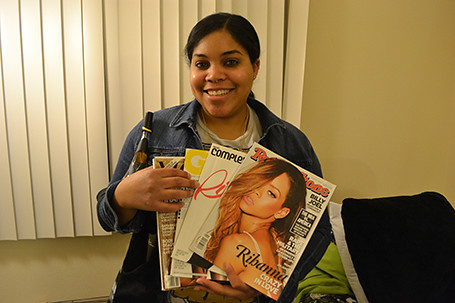Inside the Mind of a Celebrity Worshipper
Graduate student student discusses her love for pop star, Rihanna and even defends her "stan-ning" behavior.
Social media has become one of the easiest ways to directly connect fans to their favorite stars. Though it can be very convenient, it can also lead to anxiety and obsession for those who could be easily consumed with their lives.
Defining the term Celebrity Worship Syndrome (CWS)
Clinical psychologists Dr. Joan Calandra and Dr. Stephen Fischoff offer insight into the celebrity worship syndrome disorder and how one can go from being a fan to a fanatic.
By: Courtney Fowler
Living in Los Angeles, we’re exposed to celebrity culture on a daily basis. Not only is the city home to some of the world’s biggest stars but, Hollywood is infamous for producing music and television that is seen and heard throughout the world. With that very culture, comes fandom that causes regular to people to do irregular things to get close to their favorite stars. However, what happens when that fandom becomes an obsession? The term, celebrity worship syndrome, was coined in the early 2000’s and is defined as an obsessive-addictive disorder in which people become overly involved in the specifics of a famous person’s life.
“It can be anything from a person that builds monuments in their own mind to someone who becomes so invested in that celebrity that they become a threat to them,” said Dr. Stuart Fischoff.
Dr. Fischoff is a psychologist and professor who has done research on both celebrity culture as well as the syndrome itself. He even teaches a course on the topic at California State University, Los Angeles.
“Celebrity worship syndrome was originally the celebrity worship scale, so the syndrome was a different interpretation of the scale,” he said.
Psychologists theorize that although many people obsess over multiple types of celebrities from musicians to athletes, the only commonality that the groups share is that they are all in the public eye making them susceptible to more attention.
Tiffany Jones, has been a “super fan” of singer Rihanna for more than five years and though she hasn’t officially been diagnosed with the syndrome, she can identify with many of the CWS traits.
“I actually have a friend that texted me the other day and she was like your obsession is not normal,” she said.
She has seen the singer perform live multiple times, owns countless pieces of Rihanna paraphernalia and has even dedicated her personal Instagram account to the star’s pictures.
“At first I wasn’t really into Rihanna, but when I heard “Umbrella,” I was like, ‘oh my God’ she is amazing,” she said. “Rihanna’s a superstar, she is everything.”
In 2003, British newspaper “The Daily Mail”, published an article entitled, “Do You Worship the Celebs?” The piece was one of the first mainstream outlets to discuss the syndrome in a formal way.
According to the article, the cause of CWS often derives from an easy substitution for, “more conventional relationships,” especially for those people who aren’t emotional prepared for them. Additionally, the article claims that in the worst cases respect for family members has “been replaced by the worship of the famous.”
However, since then the issue of CWS has evolved even more. With the evolution of social media, access to celebrities’ personal lives is more accessible than ever before and sites like Twitter directly connect fans to their favorites at any time of the day or night.
“Social media is a complex thing,” Dr. Fischoff said. “It’s created this environment where it’s socially acceptable to immerse yourself in the activities of total strangers and it’s okay. The issue is only heightened when you add the burden of celebrity onto it.”
Even though Tiffany is comfortable with being a hard-core fan, she agrees with Dr. Fischoff in that the evolution of social media can be problematic when it comes to removing oneself from knowing the details of celebrity actions.
“Social media, I mean it definitely helps the fan become closer to the artist,” she said. “But I can see where it hurts because you’re like staying up late to see if Rihanna’s going to post something. You’re on Instagram or Twitter 24/7 to see what they’re saying and it can really get chaotic.”
While Dr. Fischoff works exclusively on the academic and research end of the syndrome, Santa Monica clinical psychologist, Dr. Joan Calandra actually treats patients afflicted with celebrity worship syndrome. Through her experiences she’s able to gauge insight into the minds of worshippers.
“A lot of times they don’t have fulfilling relationships,” she said. “Something’s missing in their life, so more than the actually celebrity, they get caught up in the seemingly idealized way that they live.”
However, she also says that in order to ever truly move on from the affliction one has to go to the root of the cause.
“Like with any other addiction, you really have to get to the root of the cause in order to change anything,” she said. “Many times worshippers will just shift that disorder to something else, but to ever stop obsessing you have to peel back the layers and figure out what’s wrong there.”
For Tiffany, comfort comes in the fact that she can remove herself from the matrix of celebrity culture and her case, Rihanna fanaticism.
“Honestly I think that I’m one of [Rihanna’s] biggest fans,” she said. “But if you go on Twitter or Instagram you will see that there are a lot more crazy people that only post Beyonce or Rihanna because that’s all that they care about. At the end of the day, Rihanna is a part of my life, but she’s not my life.”




